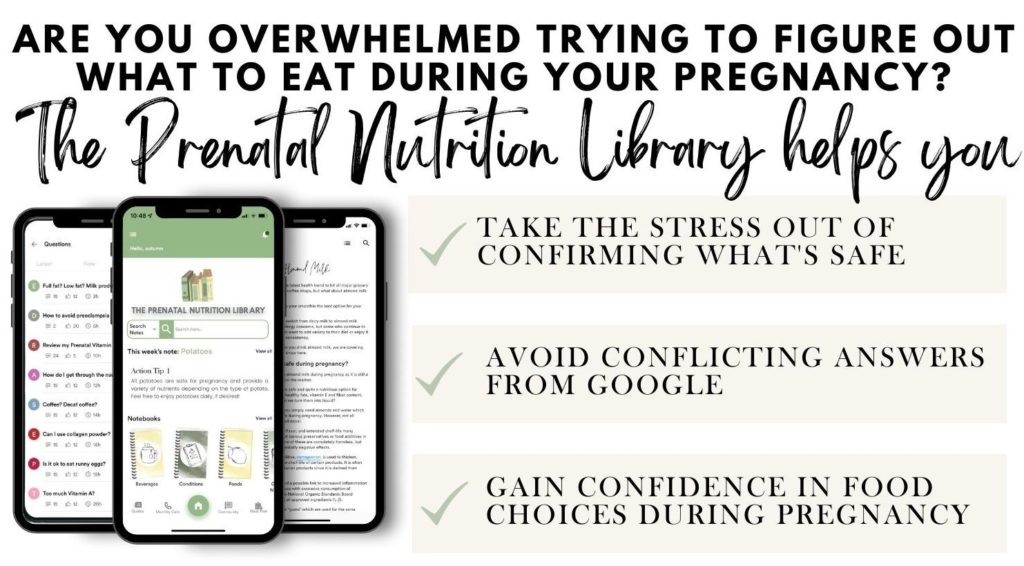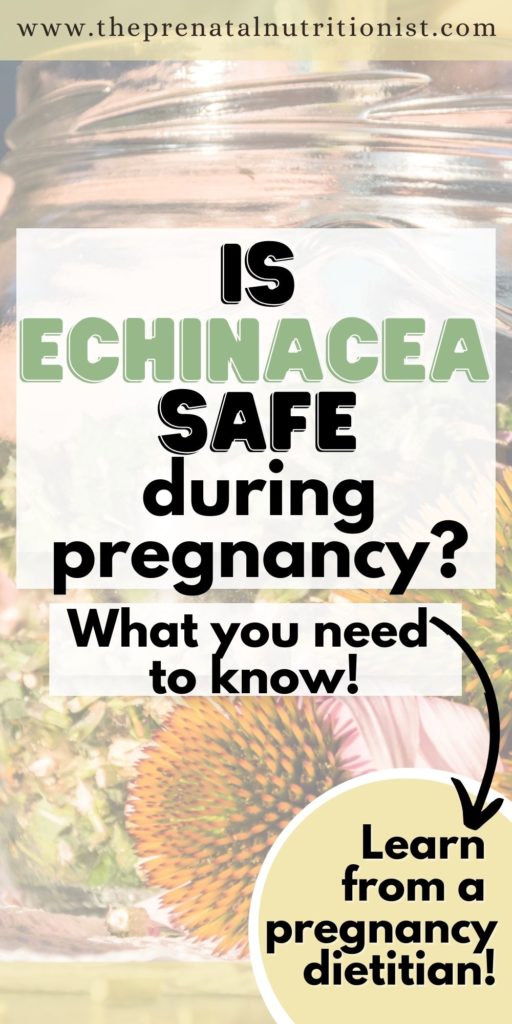
Echinacea, a flowering plant native to North America, has long been cherished for its potential to boost the immune system and combat various ailments. Commonly used to fend off colds, flu, and sore throats, echinacea has earned a reputation as a natural remedy!
Once you become pregnant, your body goes through a series of profound changes. One of these changes is a shift in your immune system’s function. During this period, the immune system operates at a lower intensity compared to its pre-pregnancy state or is “slightly suppressed.” This is a reason why pregnant women are more susceptible to common illnesses and can benefit from eating lots of immune-supporting foods.
Many expectant mothers ask about and are looking for ways to support the immune system while pregnant. Most resort to natural remedies, as we know some medications are more likely to have potential effects on the growing baby.
Echinacea has been used as an herbal remedy by pregnant people for centuries to support their immune systems when sick. So today, I’ll explore the age-old question: Is it safe for pregnant women to take echinacea? We will delve into the science behind this herbal remedy and explore its potential benefits and a few of the possible considerations for its use during pregnancy!
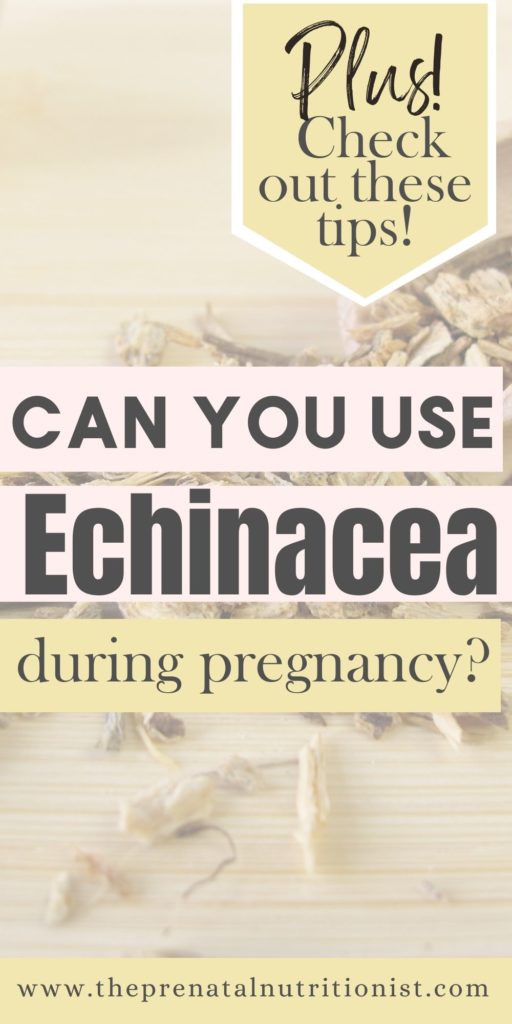
Is Echinacea Safe During Pregnancy?
From a research perspective, the jury is still out on the safety of echinacea during pregnancy. Though some studies suggest that echinacea may be safe for pregnant women when used in moderation, others point to potential concerns or caution. It’s important to note that research in this area is overall limited.
A 2003 study examined the effects of echinacea on pregnant rats and their offspring. The study found that echinacea extract did not induce harmful effects on the developing rat fetuses, suggesting potential safety. However, it’s always important to interpret animal studies cautiously, as they may not directly translate to human experiences.
One of our larger human studies on echinacea during pregnancy was released in 2016. The study included 68,522 women and their children who were involved in the Norwegian Mother and Child Cohort Study. 363 women out of this cohort reported using echinacea during pregnancy. Among these women, this study reports “no increased risk of malformations or adverse pregnancy outcomes after the use of echinacea in pregnancy.”
The use of echinacea during pregnancy is somewhat of a gray area. This is because there is still much left to learn and study. However, research during pregnancy is tricky as it’s unethical to “test things” on people during pregnancy and risk harming the baby or mom.
Echinacea is deemed safe for most people when taken in recommended doses for short durations outside of pregnancy. However, like any supplement or herb, it may have side effects. These can include gastrointestinal discomfort, allergic reactions, and interactions with other medications you may be taking. Pregnant women should be particularly cautious about potential side effects, making professional guidance even more important.
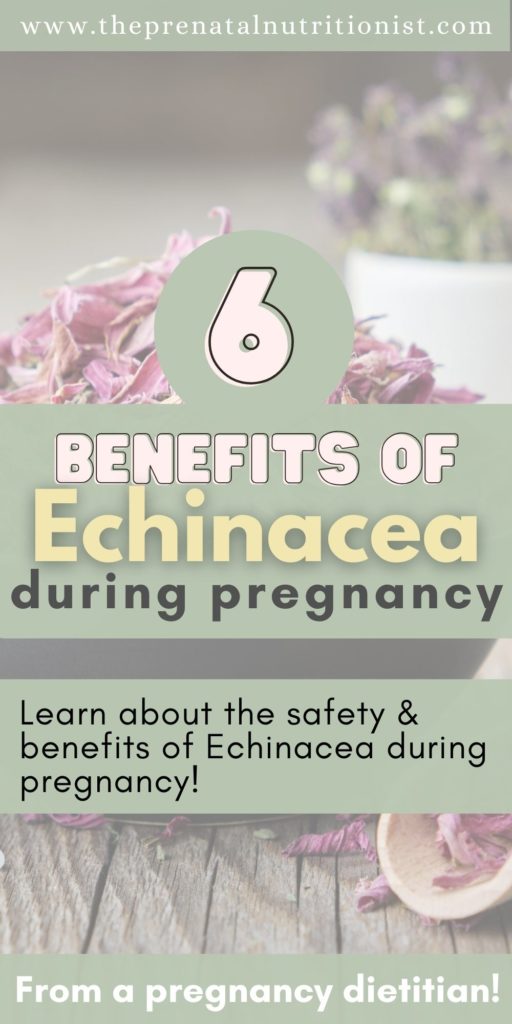
Echinacea Benefits For Pregnancy
Immune system support.
Pregnancy slightly suppresses the immune system, leaving you more susceptible to common illnesses. Echinacea’s immune-boosting properties may help fortify your body’s defenses when illness strikes. By potentially reducing the severity and duration of colds, flu, and other infections, echinacea may help you get healthier sooner when sickness strikes during pregnancy.
Natural remedy for minor ailments.
Expectant mothers often experience discomforts such as sore throats, mild coughs, and congestion. Echinacea’s anti-inflammatory and soothing properties may offer relief from these minor ailments without the need for over-the-counter (OTC) medications. They may also act as an augment when OTC medications are needed.
Stress reduction.
Pregnancy, though joyous, can also be a stressful period. Some individuals find that echinacea has calming properties, which can be helpful for managing stress and anxiety during pregnancy. As always, prioritize food and lifestyle first whenever possible—for example, going for a walk, journaling, or taking a bubble bath to support stress management.
Antioxidant properties.
Echinacea contains antioxidants, which may help combat oxidative stress and protect cells from damage. A diet rich in antioxidants can positively impact your overall health and may reduce the risk of certain pregnancy-related complications.
May reduce reduce risk of urinary tract infections (UTIs).
Urinary tract infections are more common during pregnancy. Echinacea may have antibacterial properties, so some people suggest that echinacea may help prevent or alleviate UTIs. However, it’s important to note this is anecdotal and theorized and does not have research to support this claim.
Support respiratory health.
Echinacea is purported to help alleviate symptoms of respiratory infections, potentially making it easier for pregnant individuals to breathe more comfortably. However, one study on the use of echinacea during pregnancy for respiratory health didn’t find this as an indicated use.
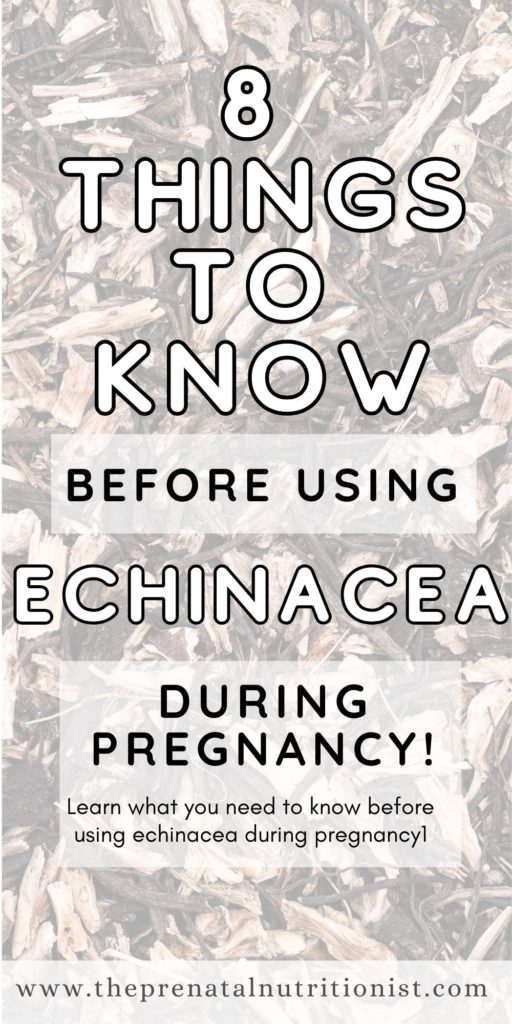
Considerations Before Taking Echinacea During Pregnancy
Consult with your healthcare provider.
Before introducing echinacea or any herbal supplement into your pregnancy regimen, consult with your healthcare provider. Your healthcare provider can offer personalized guidance based on your health history, any existing conditions, and the specific needs of your pregnancy. They will help you determine whether echinacea is safe and appropriate for you.
Capsules versus tinctures.
Many experts recommend taking echinacea as either a tincture or capsule. A tincture is an alcohol extract. It’s a very small amount of alcohol that ends up being consumed in a dose. However, if this is a concern for you personally, you may want to consider a different form or way of taking echinacea.
Consider the dose.
Determining the appropriate dosage of echinacea during pregnancy is essential. Always follow the recommended dosage on the product label or, better yet, the dosage recommended by your healthcare provider for you personally. Do not exceed the recommended dose.
Quality and source.
Unfortunately, some echinacea preparations have been found to be contaminated by heavy metals like lead. High blood lead levels during pregnancy can be harmful to a baby’s development in utero—quality matters, especially during pregnancy, to minimize potential risks.
Potential allergies or sensitivities.
Allergic reactions to echinacea are rare but can occur. Consider the possibility of allergies or sensitivities to echinacea. If you have a known allergy to plants in the Asteraceae family, such as ragweed or marigolds, you may be at higher risk for an allergic reaction to echinacea.
Avoid excessive use.
Excessive use of echinacea is not recommended during pregnancy. Once someone has discussed this with their healthcare provider and weighed the potential benefits to unknowns or risks, it is generally advisable to use it sparingly and for short durations when necessary. Overusing herbal supplements may have unintended effects, so always adhere to recommended guidelines.
There are still questions.
Studies have not been done to see if taking echinacea could impact fertility for females or males. The research on the use of echinacea during pregnancy to this point is primarily small studies and animal studies. However, these small human studies have found no harm to echinacea during pregnancy.
Prioritize food first to support immune health.
In terms of prevention, I always recommend a food and lifestyle first approach. Prioritize a well-balanced diet rich in nutrient-dense foods, adequate sleep, stress management, and other lifestyle factors that can positively influence and support your immune health. If you’re sick, prioritize fluids, rest, and protein when you can. Talk with your healthcare provider about safe supplements or medications if needed.
You can find delicious and nutritious meal ideas for each trimester of pregnancy with a purchase of the annual membership to my app, The Prenatal Nutrition Library! The annual membership includes four 60-day meal plans and a gestational diabetes course and meal plan!
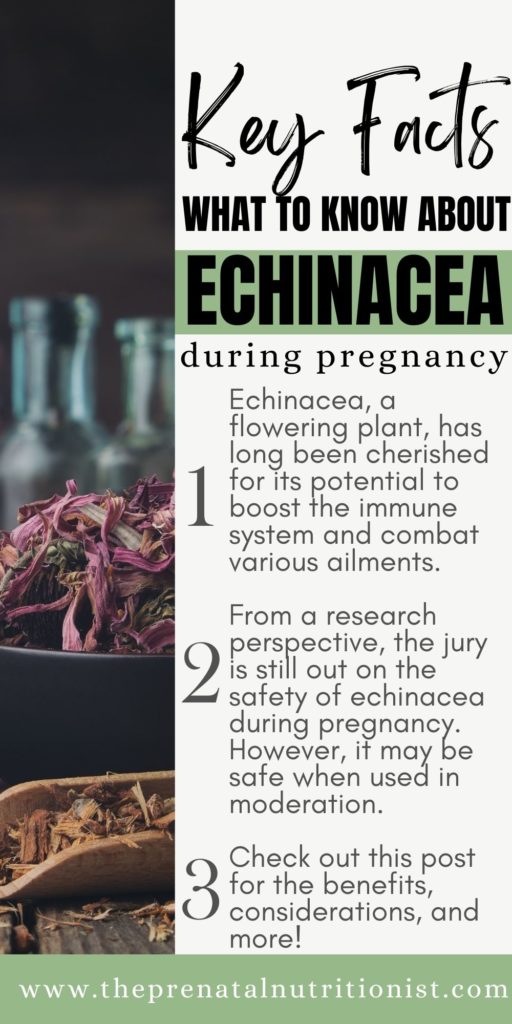
Despite its history and purported potential benefits, the safety of echinacea during pregnancy is not fully established.
The question of whether echinacea is safe during pregnancy should be approached with caution and under the guidance of your healthcare provider. While it’s often regarded as one of the best herbs for pregnancy due to its immune-supporting potential, potential side effects and individual factors should be taken into account. Quality and reputable sources are important. Prioritize a nutrient-rich diet and other methods to support your immune system while pregnant, and always consult your healthcare provider to make informed choices that support your well-being during this special time.
For more on prenatal nutrition, tips on what to eat during pregnancy, recipes, and more, head to The Prenatal Nutritionist Blog. Each week, we release valuable content to guide you through each stage of preconception and pregnancy.
If you’re tired of conflicting Google answers to your pregnancy nutrition questions, sign up for The Prenatal Nutrition Library today! No more guessing or confusion–with a membership to our comprehensive library, you will gain confidence in all aspects of your prenatal nutrition and know that all you are eating is safe and nutritious for you and your baby! Want to try a sample first? Download The Prenatal Nutrition Library app for FREE on Apple or Android to peek inside!
